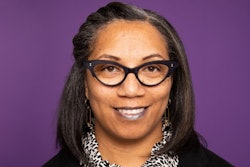In “Black Thriving in America: 2023,” data is presented detailing the experiences of Black Americans when shopping, dining out, in healthcare settings, at work, with schools, with police and more. The findings are presented in a dashboard, which will serve as a benchmark. The Payne Center for Social Justice, which is part of the Thurgood Marshall College Fund, has committed to conducting the survey with the same questions and publishing the data annually for the next 100 years.
“It becomes an annual dashboard and snapshot of the state of Black life in America as self-reported,” said Dr. M. C. Brown II, executive director and research scientist of the Payne Center for Social Justice. He said it was essential to establish data and quantify areas related to social justice issues. Gallup conducted the study. Brown noted that it reflects 40 million Black Americans. Dr. M.C. Brown II
Dr. M.C. Brown II
The Five Pillars of Wellbeing are career, community, social, physical and financial. Behind each of the indexes are sub-questions. While 60% of Black Americans are thriving in the social interactions and 53% in their careers, less than half report thriving in their community, physical and financial circumstances. Overall, 52% of Black Americans are thriving and living “best life imaginable,” which matches white Americans, but the rate masks disparities across key areas of Black life experiences.
“When you unpack each of the four areas of inquiry (dignity in public, respect at work, police and me, and safety in neighborhood), there were significant differences in Black life experiences and other people’s experiences in this country, but they did not perceive them with the same levels of negativity that they were actually experiencing,” said Brown, who formerly served as president of Kentucky State University and Alcorn State University. “While we should acknowledge the 52% thriving is progress, it also fails to account for the fact that 48% of Black Americans report that they are struggling or suffering in this nation.”
An example Brown cites is interactions with police. 26% of respondents, who were polled in February 2023, reported personally having an interaction with police over the previous 12 months. The national average is 29%. The percentage became lower when income increased. Black respondents with income under $48,000 per year reported 29%, while Black respondents with income $120,000 or higher reported 23%. Of those who had an interaction, 71% of Black Americans reported they are less likely to say they were treated fairly in the interaction as opposed to 90% of white individuals.
Dr. Keith Taylor an adjunct assistant professor at John Jay College of Criminal Justice and a veteran of the New York Police Department, teaches several courses for future police officers in Law of Police Science and Criminal Justice Administration. Those courses include engaging multi-cultural and multi-ethnic communities, introduction to policing and police in urban communities. He also teaches in the Africana Studies department.





















